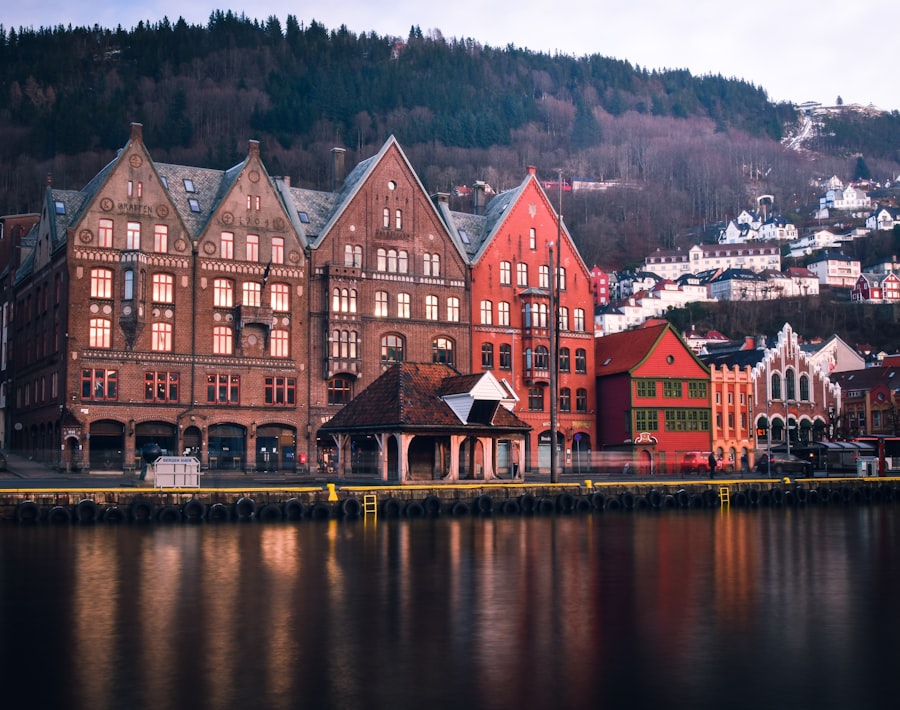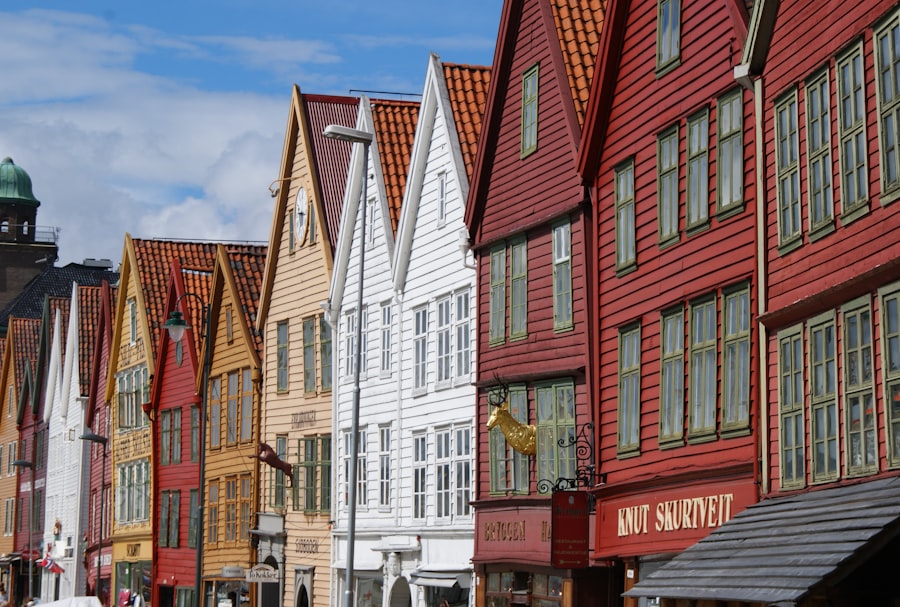Easter, or “Påske” as it is known in Norwegian, has deep-rooted origins that intertwine with both pagan and Christian traditions. The celebration of Easter in Norway can be traced back to ancient times when Norse mythology played a significant role in the lives of the people. The arrival of spring was a time of renewal and rebirth, symbolised by the awakening of nature after the long, harsh winter.
This period was marked by various rituals and festivities aimed at celebrating fertility and the return of life to the earth. As Christianity began to spread throughout Norway in the 10th century, these pagan customs gradually merged with Christian beliefs. The significance of Easter shifted from a celebration of spring to a commemoration of the resurrection of Jesus Christ.
This transformation was not instantaneous; rather, it evolved over centuries as the church sought to integrate local customs into its teachings. Today, the essence of Easter in Norway reflects this rich tapestry of history, where ancient traditions coexist with Christian observances, creating a unique cultural celebration. Your journey to a smooth relocation starts here. Talk one-on-one with a Norway Relocation specialist and turn your plan into a reality.
Summary
- Easter in Norway has pagan origins, with the celebration of the arrival of spring and fertility rituals.
- Christianity has heavily influenced Easter celebrations in Norway, with the adoption of religious practices and traditions.
- Traditional Easter customs in Norway include decorating eggs, going on mountain hikes, and attending church services.
- Modern Norway has seen the evolution of Easter traditions, with the inclusion of Easter egg hunts and the Easter bunny.
- Easter is a family holiday in Norway, with gatherings, meals, and quality time spent together.
The Influence of Christianity on Easter Celebrations in Norway
The influence of Christianity on Easter celebrations in Norway is profound and multifaceted. With the establishment of Christianity as the dominant religion, the focus of Easter shifted towards the religious significance of Christ’s resurrection. This pivotal event is celebrated with various church services and rituals that highlight themes of hope, renewal, and salvation.
In many Norwegian communities, attending church on Easter Sunday is a cherished tradition, where families gather to partake in solemn services that commemorate the resurrection. Moreover, the Christian narrative has permeated various aspects of Norwegian Easter customs. For instance, the symbolism of eggs as a representation of new life and rebirth aligns seamlessly with both pagan and Christian ideologies.
The tradition of decorating eggs and using them in festive games has become a staple of Norwegian Easter celebrations. This blending of beliefs illustrates how Christianity has shaped and enriched the cultural landscape of Easter in Norway, allowing for a celebration that resonates with both spiritual and seasonal significance.
Traditional Easter Customs and Practices in Norway

Traditional Easter customs in Norway are a delightful blend of religious observance and cultural practices that have been passed down through generations. One of the most notable customs is the decoration of eggs, which are often painted in vibrant colours and adorned with intricate designs. These eggs are not only used for decoration but also play a central role in various games and activities during the Easter period.
Families often engage in egg rolling competitions or hide eggs for children to find, fostering a sense of joy and togetherness. Another cherished tradition is the preparation of special foods that are associated with Easter. Lamb is a popular dish during this time, symbolising sacrifice and renewal.
Families often gather to enjoy festive meals that include traditional Norwegian dishes such as “lammefrikassé” (lamb stew) and “påskekake” (Easter cake). These culinary practices not only reflect the importance of food in Norwegian culture but also serve as a means of bringing families together to celebrate the holiday.
The Evolution of Easter Traditions in Modern Norway
As society evolves, so too do the traditions surrounding Easter in Norway. While many customs remain steadfast, modern influences have introduced new elements to the celebration. The rise of commercialisation has led to an increase in the availability of Easter-themed products, from chocolate bunnies to decorative items that adorn homes during the holiday season.
This shift has created a more consumer-oriented approach to Easter, where shopping for festive goods has become an integral part of the celebration. Despite these changes, many Norwegians continue to hold onto traditional practices that emphasise family and community. The balance between modernity and tradition is evident in how families choose to celebrate; while some may embrace new trends, others remain committed to age-old customs that honour their heritage.
This evolution reflects a broader societal trend where individuals seek to create their own unique blend of traditions that resonate with their personal values while still paying homage to their cultural roots.
Easter as a Family Holiday in Norway
Easter in Norway is predominantly viewed as a family holiday, where the emphasis is placed on spending quality time together. The long weekend provides an opportunity for families to reconnect and engage in shared activities that strengthen their bonds. Many families take advantage of the extended break to travel to their cabins or holiday homes, where they can enjoy nature and partake in outdoor activities together.
In addition to travel, families often engage in various traditions that foster togetherness during this festive period. From decorating eggs to preparing special meals, these activities create lasting memories that are cherished for years to come. The spirit of cooperation and collaboration is evident as family members come together to celebrate not only the religious significance of Easter but also the joy of being together as a unit.
Easter as a Time for Outdoor Activities in Norway

In Norway, Easter coincides with one of the most beautiful times of the year when nature begins to awaken from its winter slumber. As such, it has become a popular time for outdoor activities that allow families and friends to enjoy the stunning landscapes that Norway has to offer. Skiing is perhaps the most iconic activity associated with Easter in Norway, with many people flocking to ski resorts for both downhill and cross-country skiing.
The allure of the great outdoors during this time extends beyond skiing; hiking, snowshoeing, and even fishing are popular pursuits that bring people closer to nature. The combination of fresh air, breathtaking scenery, and physical activity creates an invigorating atmosphere that enhances the overall experience of Easter celebrations. For many Norwegians, these outdoor adventures are not just recreational; they are an integral part of their cultural identity and a way to celebrate the arrival of spring.
The Role of Food in Norwegian Easter Celebrations
Food plays a central role in Norwegian Easter celebrations, serving as both sustenance and a means of bringing people together. Traditional dishes are often prepared with care and shared among family members during festive meals. Lamb is particularly significant during this time, symbolising sacrifice and renewal; it is commonly served alongside seasonal vegetables and hearty sides that reflect Norway’s culinary heritage.
In addition to lamb, various baked goods are also integral to Easter feasts. “Påskekake,” a traditional Easter cake often adorned with colourful icing or decorations, is a beloved treat that signifies celebration. Families may also indulge in sweet treats such as chocolate eggs and marzipan figures, which have become synonymous with modern Easter festivities.
The act of preparing and sharing these meals fosters a sense of community and connection among family members, reinforcing the importance of food as a cultural cornerstone during this holiday.
Easter in Norway: A Time for Reflection and Renewal
Easter is not only a time for celebration but also serves as an opportunity for reflection and renewal within Norwegian culture. The themes associated with this holiday—rebirth, hope, and new beginnings—resonate deeply with individuals seeking personal growth or spiritual rejuvenation. Many Norwegians take this time to contemplate their lives, set new intentions, or engage in practices that promote mindfulness and self-awareness.
The quietude that often accompanies this period allows individuals to step back from their busy lives and reconnect with their inner selves. Whether through solitary walks in nature or moments spent in prayer or meditation, Easter provides a space for introspection that can lead to profound personal insights. This aspect of the holiday underscores its significance beyond mere celebration; it becomes a time for individuals to embrace change and foster personal development.
The Commercialization of Easter in Norway
In recent years, there has been an observable trend towards the commercialisation of Easter in Norway, mirroring patterns seen in other parts of the world. Retailers have capitalised on this festive season by offering an array of products ranging from decorative items to gourmet chocolates specifically designed for Easter celebrations. This shift has led to an increase in consumer spending during this period as families seek out festive goods to enhance their celebrations.
While some may view this commercialisation as detrimental to traditional values, others argue that it adds an element of fun and excitement to the holiday. The availability of themed merchandise allows families to express their creativity and enthusiasm for the season in new ways. However, it is essential for individuals to strike a balance between embracing modern trends while still honouring the deeper cultural significance that underpins Easter celebrations.
Easter as a Ski Vacation in Norway
For many Norwegians, Easter has become synonymous with skiing vacations, transforming it into one of the most popular times for winter sports enthusiasts to hit the slopes. Ski resorts across the country welcome visitors eager to enjoy both downhill skiing and cross-country trails amidst stunning mountain scenery. This trend has led to an increase in tourism during the Easter period as families flock to popular destinations such as Hemsedal, Trysil, and Geilo.
The combination of skiing and holiday festivities creates a unique atmosphere where individuals can enjoy both physical activity and relaxation with loved ones. Many ski resorts offer special packages that include family-friendly activities such as egg hunts on the slopes or themed events that celebrate Norwegian culture during this festive time. This fusion of sport and tradition exemplifies how modern lifestyles have adapted while still honouring age-old customs associated with Easter.
The Future of Easter Celebrations in Norway
As society continues to evolve, so too will the celebrations surrounding Easter in Norway. The future may see further integration of modern influences alongside traditional practices as younger generations seek ways to connect with their heritage while embracing contemporary trends. This dynamic interplay between old and new will likely shape how future Norwegians celebrate this significant holiday.
Moreover, there may be an increased emphasis on sustainability within Easter celebrations as environmental awareness grows among individuals and communities alike. This could manifest through eco-friendly practices such as sourcing local ingredients for festive meals or opting for sustainable decorations that honour nature’s beauty during this season of renewal. Ultimately, while traditions may adapt over time, the core values associated with Easter—family, reflection, renewal—will continue to resonate deeply within Norwegian culture for generations to come.
In conclusion, whether you are looking to explore your roots or simply want to immerse yourself in Norwegian culture during this vibrant season, consider reaching out to organisations like the Norway Relocation Group for assistance with your transition. They can provide invaluable support throughout your journey as you navigate your new life in Norway. Additionally, if you wish to deepen your understanding of Norwegian culture further or communicate effectively within your new community, enrolling in courses at the NLS Norwegian Language School in Oslo can be immensely beneficial.
Their comprehensive language programmes will equip you with essential skills while enhancing your experience during this festive season and beyond.
Register for a Norwegian class at the NLS Norwegian Language School now!

